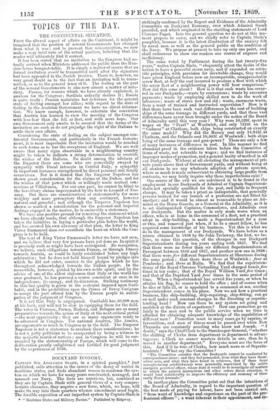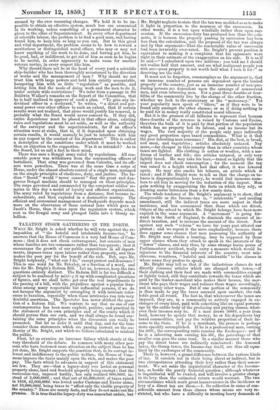DOCKYARD ECONOMY.
CAPTAIN Sin ADOLPIIIII3 SLADE, in a spirited pamphlet,* just published, calls attention to the causes of the decay of navies in maritime states, and finds abundant reason to condemn the sys- tem on which we have for many years constructed, managed, and manned our Navy. The facts are notorious, but, combined as they are by Captain Slade with general views of a very compre- hensive character, they acquire a new force, which, we hope, will make its way into those quarters whence amendment must begin. The forcible exposition of our imperfect system by Captain Slade is • " Maritime States and Military Navies." Published by Ridgway.
strikingly confirmed by the Report and Evidence of the Admiralty Committee on Dockyard Economy, over which Admiral Smart presided, and which originated in the startling statements of Lord Clarence Paget. Into the general ctuestion we do not at this mo- ment propose to enter, and we chiefly refer to Captain Blade's pamphlet, because it is the latest illustration of the anxiety felt by naval men as well as the general public on the condition of the Navy. We propose at present to take up only one point, and shall endeavour to show our readers one source of expense and inefficiency. The sums voted by Parliament during the last twenty-five years," writes Captain Slade, " eloquently attest the desire of the nation to have a powerful steam navy, and if expended on scien- tific principles, with provision for inevitable change, they would have given England before now an incomparable, unapproachable
screw fleet, at half the cost incurred to produce a fleet with which the screw fleet of a neighbouring power will bear comparison." How did this come about ? How is it that such waste has occur- red in our Dockyards,—waste by conversions; waste by excessive payments; waste by employing skilled men to do the work of labourers ; waste of stores new and old ; waste, enormous waste,
from a want of trained and instructed supervision ? How is it that there have been such vast differences in the cost of building ships of the same tonnage in different yards, and that these vast differences have never been brought under the notice of the Board of Admiralty until this very year ? Why were 10,5201. spent in wages on the "Pearl" at Woolwich, and only 7310/. on the " Cadmus" at Chatham, both ships being constructed on exactly the same model? Why did the Mersey cost only 14,8421. at Chatham, and the Orlando cost 19,503/. at Woolwich ; both ships being of the same tonnage and gun-power ? These are only a few of many instances of difference in cost. In like manner we find abundant proof in the evidence taken before the Committee of items of waste, not referable to wages ; and we find instances of improper modes of promotion, and a general laxity of method in all our Dockyards. Without at all elevating the management of pri- vate yards above that of Government yards, and without being at all anxious to see any wholesale adoption of private systems; where so much is made subservient to obtaining large profits from contracts, we may fairly inquire why these imperfections exi.14 ?
One source of the evil we are convinced is to be found in the employment in our Dockyards of Admiral or Captain Superinten- dents not specially qualified for the post, and liable to frequent change. It may be taken i priori as indisputable, that generally persons trained for one branch of a profession are not fitted for another ; and it would be almost as reasonable to place an Ad- miral at the Horse Guards or a General at the Admiralty, as it is to set distinguished Captains, Commodores, and Admirals over our Dockyards. But the matter is only made worse when an officer, who is at home in the command of a fleet, not a practical adept in ship-building, is made a Superintendent for a year or two, and removed just when, if he be a smart fellow, he has acquired some knowledge of his business. Yet this is what we do in the management of our Dockyards. We have before us a return obtained in 1858 by Sir John Trelawny, the first, we be- lieve, to raise this question, of the changes in our Dockyard Superintendents during ten years ending with 1857. We find that there were no fewer than six different Superintendents at Devonport between 1846 and 1857, and another new one in 1858; that there were five different Superintendents at Sheerness during tho same period ; that there were three at Woolwich ; four at Pembroke; and three at Malta. We find that the superinten- dency of the Royal Clarence Victualling Yard changed hands five times in ten years ; that of the Royal William Yard five times ; and that of the Deptford Yard four times in the same period of time. When a Superintendent has served five years, or when he attains his flag, he ceases to hold the office ; and of course when he dies or falls ill, or is appointed to a command at sea, another Superintendent comes in his place. Now we ask how a practical business, like ship-building, ship-repairing, ship-fitting, can go on well under such constant changes in the directing or superin- tending head ? How can there be any system set going and modified at the dictate of experience ? How can promotion go on fairly to the men and to the public service when no time is afforded for obtaining adequate knowledge of the capabilities of different men ? Promotion must in many cases go by caprice, or favouritism, and men of fitness must be passed over when New Pharaohs are constantly acceding who know not Joseph. " I doubt," says the Chief Clerk to the Storekeeper-General, "whether the shifting of Clerks from department to department is advan- tageous; a Clerk no sooner masters details in one, than he is moved to another department." Everyone must see the force of this. And if it be true of Clerks, how much more so of Superin- tendents ? What say the Committee ? "The Committee consider that the Dockyards cannot be conducted by correspondence alone; and they feel persuaded, from what they have them- selves seen, and what they have heard in evidence, that if these large manufacturing establishments were personally supervised by the active energetic practical officer, whose duty it would be to investigate all matters to which the printed instructions and other orders direct attention, it would tend considerably to improve the efficiency and economy of these costly Naval Arsenals."
In another place the Committee point out that the intentions of the Board of Admiralty, in regard to the important question of the best mode of paying for labour, have not been carried out, " from want of knowledge and experience on the part of the pro- fessional officers" ; a want inherent in their appointment, and ia- creased by the ever recurring changes. We hold it to be im- possible to obtain an effective system, much less one economical in its working, unless something of a permanent character be given to the office of Superintendent. In every other department of scientific labour, the problem is to find a good man, and having found him, to keep him as long as you can. But in this great and vital department, the problem seems to be how to reward a meritorious or distinguished naval officer, who may or may not know anything of the work to be done, and having got him, be he good, bad, or indifferent, to get rid of him as soon as he begins to be useful, in order apparently to make room for another veteran novice, in every respect like him. Why should there not be at the head of every yard a scientific ship-builder who has been thoroughly accustomed to the direction of works and the management of men ? Why should we not trust him with large powers and hold him strictly accountable, hampering him with as little "regulation" as possible, and letting him find the mode of doing work and the men to do it, under certain wide restrictions ? We infer from a passage in Sir Baldwin Walker's remarks on the Report of the Committee, that he is half inclined to approve of such a plan. "To give any in- dividual officer in a dockyard," he writes, " a direct and per- sonal power over other officers to such an extent, that if certain results were not realized, that alone would justify his removal, is probably what the Board would never consent to. If they did, entire dependence must be placed in that officer alone, existing rules and regulations must be set aside, as well as the authority of the surveyor and the superintendents, for if an officer's situation were at stake, that is, if it depended upon obtaining certain results, it would. scarcely be just to interfere with him in any respect in the conduct of his department." This is rather a description of the conditions under which it must be worked than an objection to the suggestion. Was it so intended ? As to the Board, let us call a fact to their mind.
There was once a Bengal army ruled by regulations. All rea- sonable power was ,withdrawn from the commanding officers of battalions'. That army was governed from Calcutta, and its offi- cers were powerless. There was at the same time a corps of Horse, under the almost absolute control of a single man, managed on the simple principles of obedience, duty, and justice. The In- dian i0Board " would " never consent" that the great and dan- gerous Bengal machine should be managed on those principles. The corps governed and commanded by the competent soldier re- mains to this day a model of loyalty and efficient organization. The army ruled by regulations from a distance, first became in- subordinate, and then exploded in a destructive mutiny. The efficient and economical management of Dockyards depends much more on the observance of those natural laws which gave us Jacob's Horse, than it does upon the regulation system, which cost us the Bengal army and plunged India into a bloody re- bellion.



































 Previous page
Previous page